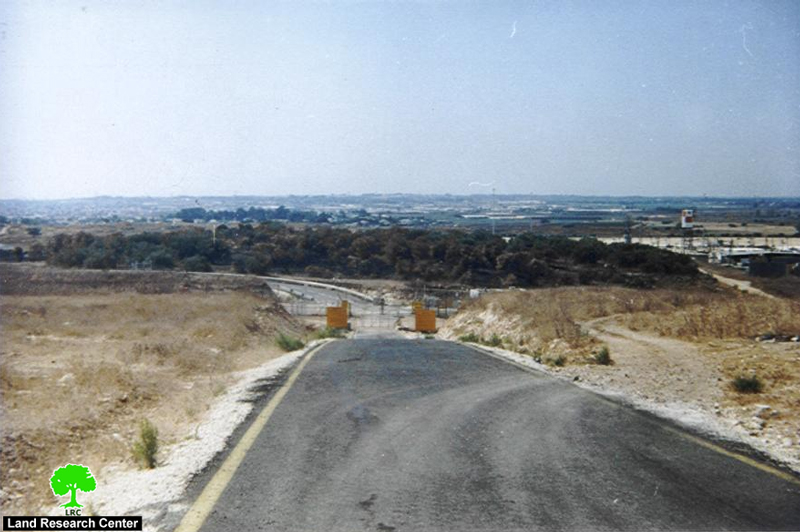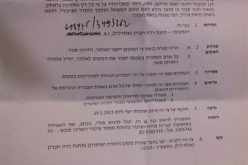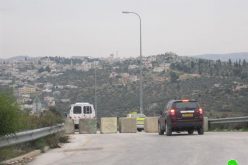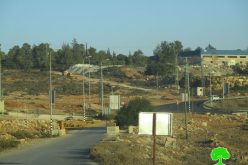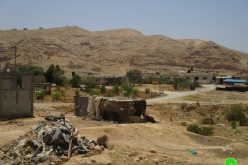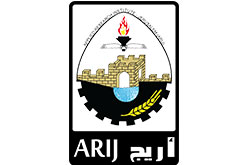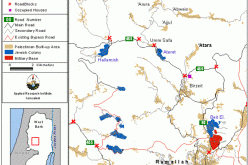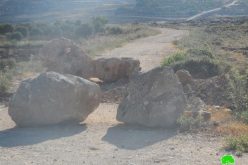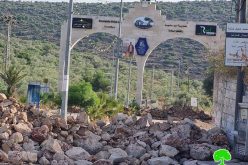Closure of an agricultural Wall gate threatens the olive-picking season in Far’un village
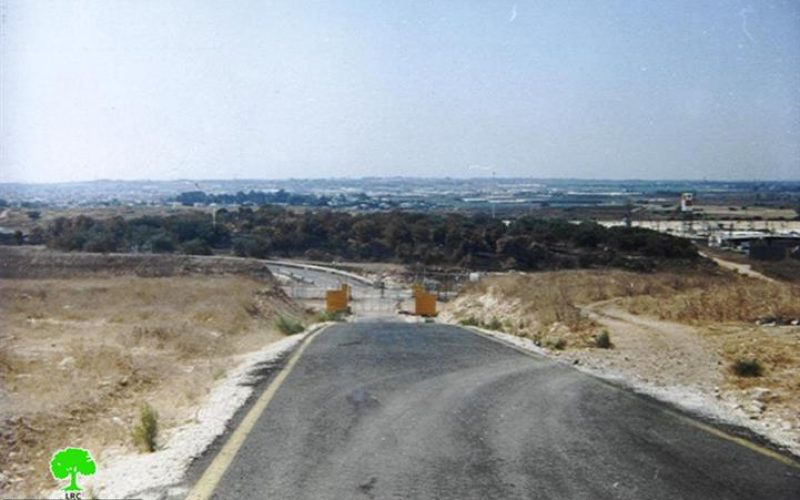
Photo1: Far'un, Tulkarem: an olive orchard field is threatened
by the closure of gate number 708 seen in the forefront of the picture)
The Israeli occupation forces informed the Red Cross office in Tulkarem governorate of the decision to close the Wall agricultural gate number 708 located at the western edge of Far'un village until the end of the coming October. To justify their decision, the Israeli occupation forces allegedly claimed that farmers use the gate to infiltrate into Israel proper.
The seriousness of this Israeli act stems from its timing as farmers are embracing for the olive picking season which starts next month. Knowing that there are more than 3000 dunums of the village's olive and citrus orchards are separated behind the Wall path one can expect the great material loss the village will suffer in case this action is implemented.
In other development, the Israeli occupation forces closed on Wednesday, September 13, 2006, the Wall agricultural gates to the west of Khirbet Jubara and Kafr Sur preventing farmers from entering into their lands behind the Wall. This action came as part of a total one day closure over the governorate of Tulkarem which was put in force for security claims and allegations on part of the Israeli occupation forces.
Far'un village
It is located 5 km to the south of the city of Tulkarem. Its population mounts to 3500. The village's total surface land area is 4333 dunums, of which only 495 dunums are built up area.
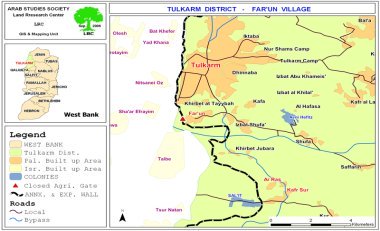
Map 1: Location of Far'un village, Tulkarem governorate
Map prepared by GIS unit-LRC
The Wall construction works started in Far'un lands in January 2002, at the length of 5 km and average width of 70 meters. In this section, the Wall path was built of barbed wires, electronic fences, trenches, security roads and surveillance cameras. It was completed at the beginning of the year 2003 after besieging the village from the west and southwest. A single agricultural gate carrying the number of 708 was opened in the Wall path for the use of Far'un farmers whose lands have been separated behind the Wall. Another gate is jointly used with Khirbet Jubara's farmers to the south of Far'un which carries the number of 22.
After its inception, the Far'un Wall agricultural gate remained close for almost 4 months until it was opened in May, 2003 as a response to continuous pressure on part of the local people and Red Cross offices in Tulkarem, but, only three time a day as followed: from 8-9 AM; from 11-12 noon; and from 3-4 PM.
However, the local people didn't give up and continue to use pressure against the occupation authorities in coordination with the Red Cross offices in Tulkarem until the gate's opening schedule was modified in March, 2006 to be as followed: from 8 AM until 1 PM, and, from 3 until 4 PM. In addition to all these limitations, only one fifth of Far'un's farmers were given passing permits from the Israeli military to cross the gate and tend their lands.
Impact of Wall construction on Far'un village
Economic impacts:
1. The separation of about 300 dunums of fertile agricultural lands behind the Wall path, of which 2700 dunums alone are cultivated with olive trees, and the rest with citrus and irrigated crops;
2. The destruction of 3560 dunums under the path of the Wall and the uprooting of hundreds of fruitful olive trees during this process;
3. The deprivation of at least 3000 people of the village citizens from their only sources of livelihood, whether inside the green line by preventing them from reaching workplaces or as a result of the separation of their lands behind the Wall.
4. The confiscation of about 50 dunums from the lands that was separated behind the Wall for the establishment of a commercial zone which will only serve the interests of the occupation. The land confiscation was stated in military order number T/33/03 and located in basin number 8465.
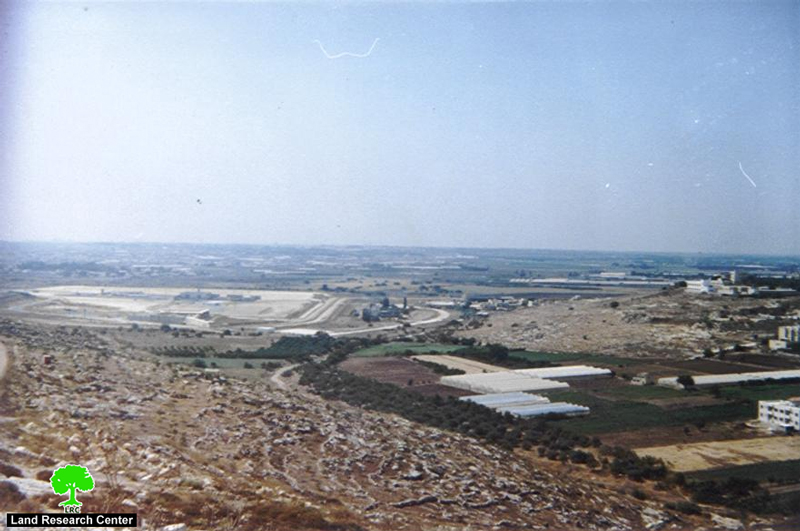
Photo 2: part of Far'un's separated land that was leveled for the commercial zone
5. A huge fire destroyed about 500 dunums from the village's separated land during July, 2006 after the Israeli occupation forces had prevented Palestinian fire squads and local people from extinguishing it. It is very likely, according to local people, that the settlers of Sha'are Ofarim were responsible for igniting the fire as it started near the settlement.
6. Ever since the establishment of the Wall the Israeli occupation army has been preventing farmers and shepherds from building any barracks or farms at the depth of 150 meters from the eastern edge of the Wall or , even, from grazing cattle in this strip of land.
7. The distribution of 12 demolition orders against houses which are located in the eastern bank of the Wall although some of them are at the distance of 1200 meters form the Wall (the house of Mr. Munir Abdullah Omer). Of the 12 houses, four are populated while the remaining eight are under construction.
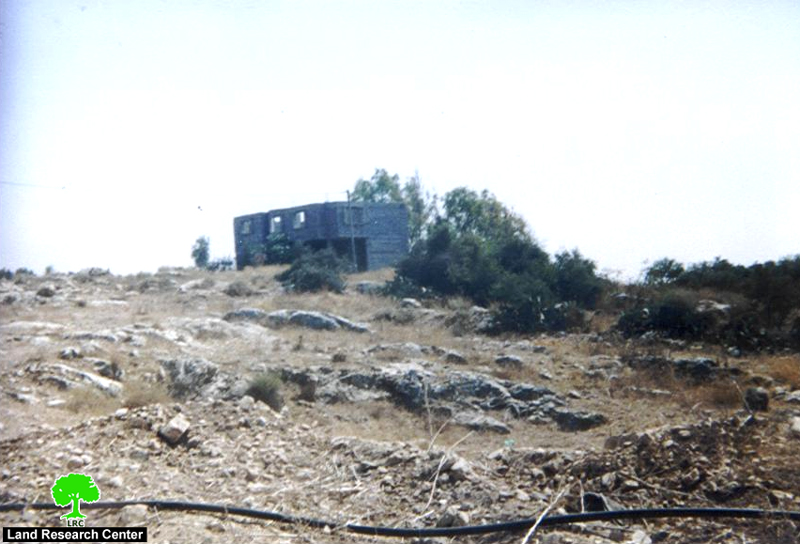
(Photo 3: Mr. Munir Abdullah Omer's threatened house)
8. Depriving 26 families from the village of the right to get benefit of a land lease agreement with the municipality after the Wall path had cross-crossed their leased agricultural lands.
9. The Wall path has destroyed six green houses and one animal shed owned by the families of Mohammed Ahmad Abdul Fattah and Abdul Karim Omer.
10. In May, 2006, the Israeli occupation forces issued military decree number T/90/06 which stated the confiscation of about 587 dunums from the lands of the villages of Far'un, at Tayba and ar Ras for the purpose of revising the Wall path in the area. In case this revision was carried out, it would lead to further confiscation and destruction of Palestinian agricultural land.
Social and psychological impact:
Because of Far'un's close location to Palestinian towns and villages in the Triangle area inside Israel such as at Atayba, strong social and cultural relations developed between its families and the Arab citizens of these towns and villages. These relationships are badly affected now because of the erection of the Wall and the difficulties to move from one side to another. For long time now, many families are unable to communicate with their members on the other side of the frontiers. This aggravates the psychological suffering of these families.
A human loss
In an interview with LRC field worker, Mr. Salim Hazahza, 65 years old, a farmer from Far'un said the following: 'I have lost parts of my land to the Wall. In addition, a chicken farm for egg production was destroyed. But, this is nothing compared to the loss of my son, Imad, who was instantly killed by a bullet fired by an Israeli border police soldier when he resisted the grabbing of his land. The loss of my son has caused a great psychological and mental suffering to me and the whole of my family'.
Prepared by
The Land Research Center
LRC


